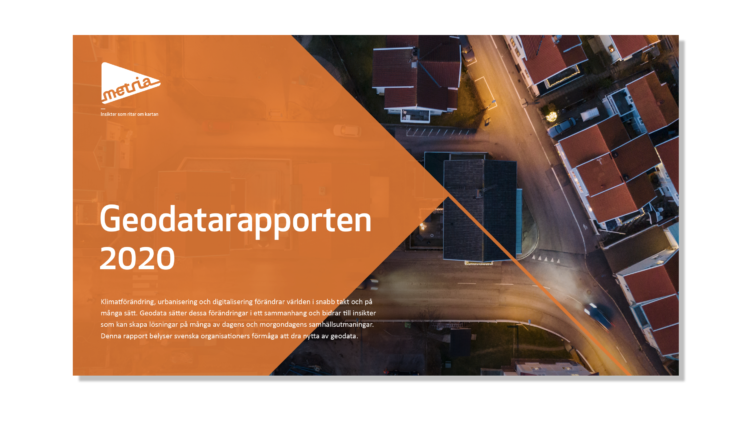As digitization has increased, geodata has grown in value and is a valuable, strategic resource for more and more businesses. The areas of use are almost endless and cut across all areas of activity. At the same time, the Geodata Report 2020 shows that there is great potential for Swedish organizations to increase their benefits from geodata.
Geodata creates business benefits
The enormous amounts of data produced in the digital society contain completely new information that can lead to insights that were previously impossible. Success in managing the data lies in the ability to transform data into knowledge that can create business value for the organization. The geographical dimension provides a unique opportunity to discover complex relationships and thus create new insights.
The 2020 Geodata Report shows that geodata creates major positive effects for many Swedish organizations. The majority state that geodata creates business benefits and that it is one of the most important bases for decisions. It helps to create understanding for decisions at all levels - both for business and operational management and for daily support for administrators.
Few organizations work strategically
Despite this, only two percent of organizations have a strategic optimization in their use of geodata. Lack of business knowledge, budget constraints and understaffing are cited as key reasons for not being able to further leverage geodata in new areas of the organization.
Information security a challenge for many
Today, we rely almost exclusively on digital information for society to function. Rapid developments are creating new vulnerabilities and the need to protect and manage data securely is high. It is about preventing information from being leaked, corrupted and destroyed, but also about ensuring that the right information is available to the right people at the right time.
The Geodata Report shows that information security is high on the agenda of many companies, municipalities and authorities, but that they face major challenges in both availability and quality. Well over half of respondents say they have difficulty finding information and/or determining its quality. These shortcomings have consequences for organizations' ability to make informed decisions.
Geodata creates business value
The strategic use of geodata can have many beneficial effects: analogue processes can be replaced by digital ones, new technologies and large amounts of data can be used to gain new insights, communication with customers and citizens can be improved, and entirely new activities can be streamlined. This leads to smarter, greener and safer decisions to achieve business objectives.
How to increase the benefits of geodata?
Getting the most out of geospatial data across an organization requires the right conditions and a strategic approach that links workflows, technology and geographic information to user needs and business objectives.
The geodata report shows that those organizations that work in a structured way with the collection, management and storage of geodata and have procedures for having updated quality-assured geodata have good conditions for using geodata in the organization.
Conclusions of the report:
- 72 percent believe that geospatial data could create additional benefits in new parts of organizations.
- 46% believe that a lack of knowledge in the organization is an obstacle to deriving greater benefit from geodata.
- 58% find it difficult to find the information they need for their work.
- 66% find it difficult to determine the quality of the information
- 7% have up-to-date metadata.




